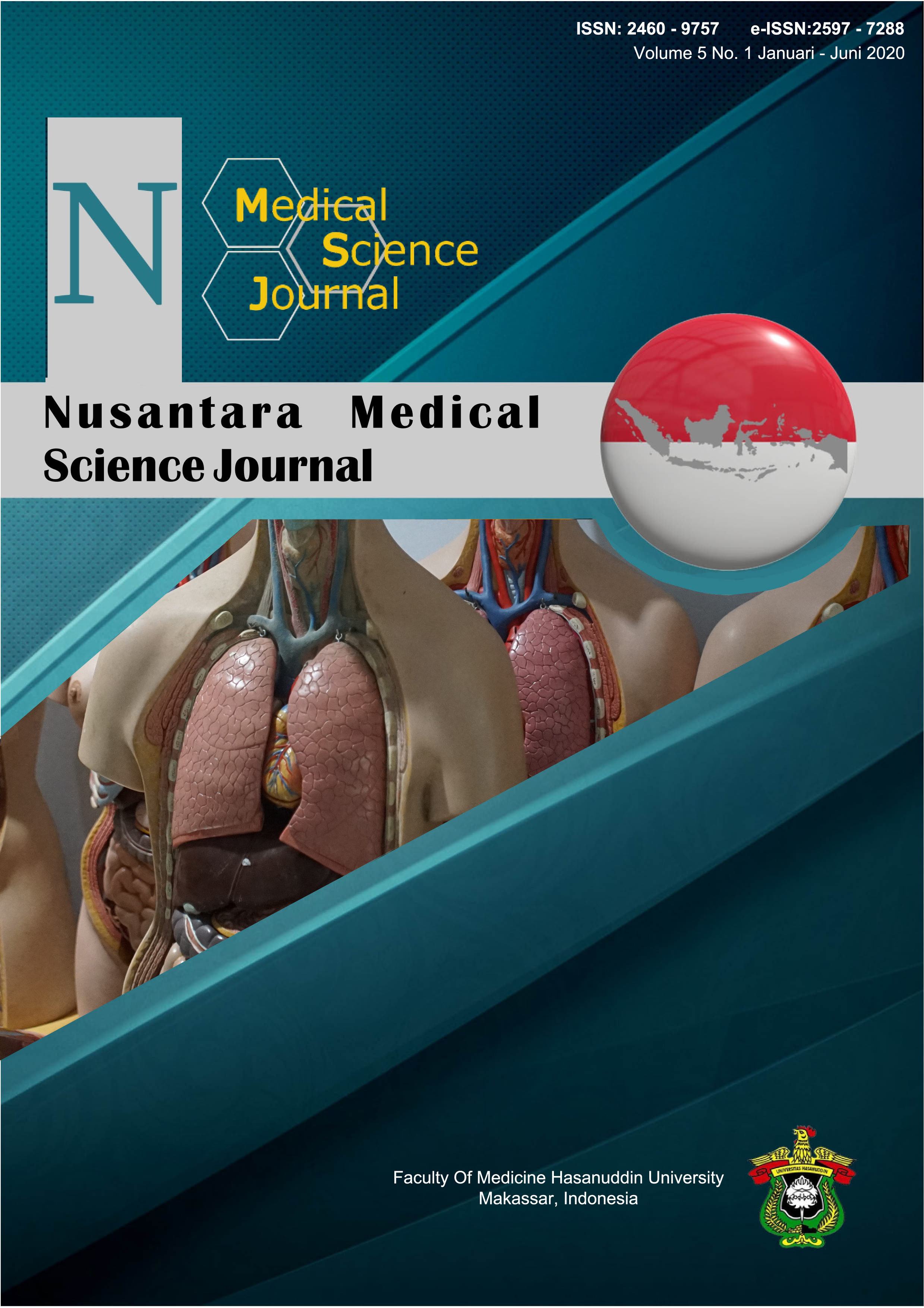Case Reports on Severe Antituberculosis-Drug Induced Hepatotoxicity in Tuberculosis Patients: The Post-Incidence Therapy
DOI:
https://doi.org/10.20956/nmsj.v5i1.13450Abstract
Introduction: The first-line regimen for tuberculosis (TB) treatment comprises Isoniazid, Rifampicin, Pyrazinamide, and Ethambutol. However, these drugs are known to potentially cause hepatotoxicity. This study aimed to evaluate hepatotoxicity incidence in patients during intensive phase of anti-tuberculosis treatment focusing on post-incidence therapy. Methods: The study involved pulmonary TB patients who were admitted to the National Lung Health Center due to hepatotoxicity after receiving fixed-dose combination of antituberculosis drugs (FDC-AT) in September-October 2019. Drug-related hepatotoxicity is defined as an increase in serum alanine aminotransferase (ALT) or aspartate aminotransferase (AST) levels greater than 2.5 times of the normal upper limit (ULN) with an increase in bilirubin level. Results: There were 8 patients admitted to the center due to hepatotoxicity, 4 of them experienced grade 3 (severe) hepatotoxicity, during which the ALT, AST, bilirubin levels increased 5-10 times of the ULN. The post-hepatotoxicity treatment includes the cessation of FDC-AT treatment followed by hepatoprotective supplements. Following two weeks of treatments, the biomarker levels of two out of four patients went back to normal and the AT therapy was resumed. Meanwhile, the other two patients continued to receive the hepatoprotective therapy for up to 8 weeks. However, when the treatment failed to bring the transaminase level back to normal, a different AT regimen was prescribed. Conclusions: The cessation of FDC-AT and the use of hepatoprotective supplements for two to eight weeks were able to alleviate the AT-induced severe hepatotoxicity. A close monitoring of liver biomarkers is warranted to prevent the incidence of hepatotoxicity in patients receiving antituberculosis
References
Caminero, J.A., Scardigli, A. 2015. Classification of antituberculosis drugs: a new proposal based on the most recent evidence. European Respiratory Journal, 46:887-893.
World Health Organization. Global Tuberculosis Report. 2018. Retrieved from https://www.who.int/tb/publications/global_report/en/
Jeong, I., Park, J.S., Cho, Y.J., Yoon, H., Song, J., Lee, C.T., Lee, J.H. 2014. Drug Induced Hepatotoxicity of Anti-tuberculosis Drugs and Their Serum Levels. Journal of Korean Sciences, 30:167-172.
Farrell, G.C. 1994; Drug-induced acute hepatitis In: Drug-induced liver disease. Farrell GG (Ed.). Churchill Livingstone, Edinburgh, UK. 247– 299
Yew, W.W., Chang, K. C., Chan, D. P. 2018. Oxidative stress and first-line antituberculosis drug-induced hepatotoxicity. Antimicrobial Agents and Chemotherapy, 62(8), e02637-17.
Saukkonen, J.J., Cohn, D.L., Jasmer, R.M., Schenker, S., Jereb, J.A., Nolan, C.M., Bernardo, J. 2006. An official ATS statement: Hepatotoxicity of Antituberculosis Therapy. American Journal of Respiratory and Critical Care Medicine, 174(8), 935-952
Tostmann, A., Boeree, M.J., Aarnoutse, R.B., Lange. 2008. Antituberculosis drug-induced hepatotoxicity: Concise up-to-date review. Journal of Gastroenterology and Hepatology, 23: 192-202.
Adhvaryu, M.R., Reddy, N.M., Vakharia, B.C. 2008. Prevention of hepatotoxicity due to anti tuberculosis treatment: A novel integrative approach. World Journal of Gastroenterology, 14: 4753-4762.
Ningrum, V.D.A., Megasari, A., Hanifah, S. 2010. Hepatotoksisitas Pada Pengobatan Tuberkulosis di RSUD Tangerang-Indonesia. Jurnal Ilmiah Farmasi, 7(1):39-49.
Djabir Y.Y., Arsyad A., Usmar U., Wahyudin E., Arwi H., and Rupang I.S. 2020. The stages of development of liver and renal injuries in rats induced by fixed dose combination of antituberculosis regimen. FABAD Journal of Pharmaceutical Science, 45(1): 29-35
Herlianto, B., Mustika, S., Supriono., Pratomo, B., Achmad, H. 2014. Role of Phytopharmacy as Hepatoprotector in Chronic Hepatitis. The Indonesian Journal of Gastroenterology, Hepatology and Digestive Endoscopy, 15(3): 157-160
Marinda, F.D. 2014. Hepatoprotective effect of curcumin in chronic hepatitis. Medical Journal of Lampung University, 3(7): 52-56.
Downloads
Published
How to Cite
Issue
Section
License
Copyright (c) 2020 Nasrawati Basir, Yulia Yusrini Djabir, Arif Santoso

This work is licensed under a Creative Commons Attribution 4.0 International License.









